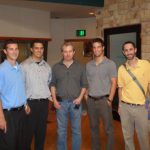Like a lot of children growing up, Dan had to share a room with a sibling. The only difference is that their room was actually the trunk of a Buick. Using that as a starting point, Dan has been motivated and determined to succeed in everything that he does. From his humble beginnings in Idaho, through hard work and dedication, he now owns and operates the largest guitar school in New York City.
 In the eighth grade, Dan’s family experienced some rather large financial problems. As a result he decided to put on his best outfit at the time, his boy scout uniform, and get a job landscaping. Needless to say, he hated it. He disliked it so much that he literally counted the seconds until his time was over. He learned from this experience “to never trade your time for money.” he would later incorporate this lesson into the beginning stages of his guitar teaching career.
In the eighth grade, Dan’s family experienced some rather large financial problems. As a result he decided to put on his best outfit at the time, his boy scout uniform, and get a job landscaping. Needless to say, he hated it. He disliked it so much that he literally counted the seconds until his time was over. He learned from this experience “to never trade your time for money.” he would later incorporate this lesson into the beginning stages of his guitar teaching career.
In high school, Dan longed for social status, which he soon found through sports. The only problem was that he wasn’t particularly athletic. He tried track and field and a couple of other sports, but found his place playing football. After high school, he decided to walk onto the University of Idaho football team,
He was cut his first year. Being as he was small, slow and uncoordinated, the coaches thought that he wouldn’t be able to contribute to the team. Dan did not let this criticism stop him however, He worked in the off season with a guy named Eric Yarber, the smallest guy on the football team. Yarber would later go on to be a kick returner for the NFL’s Washington Redskins. Recognizing Dan’s determination and willingness to work hard, the two became workout partners.
He made the football team the next year and centered his life around the game. Every decision he would make was based on its effect on his football career. After a couple of years on the team, he saw himself sliding down the depth chart with his position going to younger, more athletically talented guys. He soon realized that he was not going to become the star football player that he wanted to be. So he quit football and took up the guitar. He was convinced that if he applied the same regimented work schedule to guitar that he had to football, that he could be successful. So he vowed to play the guitar for two hours a day to learn how to play. Just as he had done with football, he now based his decisions in life on what the effect would be on his guitar playing. The guitar became a new path to achieving that recognition from his peers.
The guitar led him to dream of becoming a rock star. He formed a band in New York City, called the Dan Emery Mystery Band. One day, he received a call from a promoter in the Netherlands wanting to book his band for a tour through Europe. This dilemma proved to be the end one dream and the start of another. He was forced to decide to either go on tour, or stay in New York City to see the birth of his first child, Dan chose family over stardom and moved onto a new dream of providing a comfortable living situation for his family.
With a Masters of Education degree from Columbia and experience as a guitarist for his band, Dan decided that could teach the “thrill and pride of guitar playing to all those who desire it.” His original goal was to get five students. Then ten, then twenty. Once he reached forty students he realized that he had to find help to handle the demand. It was then that he decided to form a guitar school. Two failed attempts to start the school didn’t stop him, and the third time was the charm. His guitar school now has the 7th floor in a building directly across the street from Madison Square Garden in New York City. Dan sees his school as a symbol that all dreams are possible.
Dan attributes his success to two things and feels that they can be beneficial to anyone trying to pursue a passion. The first is culture, focused on building character. Like Benjamin Franklin, every week the NYC Guitar School employees and students work on virtues such as sincerity. He hopes that his students will carry these teachings with them wherever they go and in whatever they do.
The other key taught is leverage, meaning the questioning nature of how rules can be changed. “Instead of going to client’s houses to teach guitar, why don’t they come to an office?” In less than three years, practicing these two ideas, our office now has 358 students, 5 classrooms, and is approaching Dan’s personal goal of 1,000 students
His advice to students:
“If anything is worth doing, do it well. The way that you do anything you want to do is ultimately the way you will do everything that you want to do. If you feel that you should clean your bathroom, and if you can clean that bathroom well, you can do anything well. If you can’t clean the bathroom well, then you won’t be able to be successful with any responsibilities attached. So clean the bathroom well.”
A question that I had for Dan, given his story, related to confidence. I asked him how do you achieve that confidence to do the things you’ve done? Here was his response:
“The most important type of confidence is doing what you say you are going to do. The most important thing is will. You either do it or you don’t do it. I study martial arts. And I still have fear when I step into the class. The same has been true in my business. Twice now, I’ve been close to bankruptcy. I was afraid, but I did it anyway. Going back and seeing what you’ve done makes you achieve that confidence. Having that track record allows you to know that you’re a good person to be with in the situations that you put yourself in.”
Interview
I track retention like you wouldn’t believe. I keep stats on everything. I know that if someone takes lessons with Matt Boas, two years from now, they’ll still be taking lessons with Matt Boas. So I can do the math and make a gross revenue prediction based on the teacher. It’s also a sign. Since I’m not in the lessons, ultimately the only way I can tell if the lessons are going well is if I hear good things and if they come back.
We don’t expect that everyone is going to take lessons for years. People move to California. They have babies. But if you take a big enough sample of people, the skill and passion of the teacher will produce dramatic differences between people who are just becoming teachers.
If you really want my story, I can’t start when I’m 20 or 21. I would start earlier. Kind of a major deal for me early as a kid was that my family didn’t have very much money. There were other problems in my family too. Sometimes, we did not have a place to live. I used to share a room with my sister. But that room was actually the trunk of a Buick. We both slept in the trunk. I wasn’t in the public schools either.
When I went into the public schools, it was kind of a shocking system. I was in eighth grade. I was different from the other kids in that I didn’t have a place to live. No of the other kids knew that about me. There were other things that concerned me too. But I think that feeling has been really important to me. Because what I feel is necessary is very small. That’s been a huge freedom for me in my life.
I don’t need to make a lot of money. I don’t need a big house. I don’t need fancy food. That’s been a huge advantage and strength for me. So I definitely learned to work. I was bringing money home in eighth. I put on my best outfit, which was my Boy Scout uniform, and went out to get a job landscaping in Sedona, Arizona. I hated that job so much. As I worked, I would go, ‘One thousand one. One thousand two. One thousand three.’ Until I got to one minute. Then I would count to two minutes. I was just counting until I finished. Definitely something I got out of that is that if gotta work, you can work. But it is terrible to trade your time for money. Don’t ever trade your time for money. Even teaching guitar lessons, I’ve realized that I’m here in this room with this person and I’m not really here. I’m trading my time for money. And that’s sick. You should never trade your time for money. You should never, ever do that.
When I first started teaching guitar lessons, I was hustling up and down the streets of New York City. I was putting flyers on lamp posts. I put flyers up all over the place. I’d get phone calls and track my phone calls. I’d work on how to get a great phone call.
So I was hustling up and down the streets and I was putting flyers up on lamp posts. I was on the corner of 86th and York Avenue. I was literally running from block to block so I could be faster. And I saw this homeless guy with a shopping cart full of bottles and cans. He was running the other direction from garbage can to garbage can, pulling out cans and bottles. He wanted to get them before anyone else got them.
Here I am putting up flyers and I look to the left and see this limousine drive past. In the back, there’s this guy talking on the telephone. And I could tell he was working. I thought, ‘Wait a minute. Here we are. We are three amazing human beings. We are three evolved masterpieces of capability. That homeless guy is going all out and he’s making four or five dollars an hour. I’m going all out and I’m making maybe fifteen an hour. And that guy is going all out and maybe he’s making hundreds of thousands of dollars an hour.’ So I thought, ‘If I’m going to go all out, why don’t I go all out in a way that really works for me?’
When I got to high school, I really wanted to have a social position. A name. In my high school that was in sports. So I started playing sports like crazy. I got really into football and track. I really wanted to play college football. I went to the University of Idaho and I walked on and I got cut. I like to say that I may have been small, or slow, but I was also uncoordinated.
I didn’t seem like a natural football player. There was this guy named Eric Yarber there. When I was in high school, I had pictures of this guy in my room. He was the smallest player in the Big Sky Conference. He was an All American who went to go on to be a kick returner for the Washington Redskins.
When I was a senior in high school, my coach gave me a pass so I could go to the games and see Eric Yarber play. The guy was amazing! I remember one time the other team was blitzing. You could see what was going on. The Idaho quarterback was going to call an audible and dump it to Eric Yarber. I could also see that the safety was sprinting full out before the snap at Eric Yarber because he knew what was happening. The ball was thrown high. Eric Yarber was completely stretched out. And he got hit so hard, and so loud, and got thrown down so violently that the entire stadium went quiet. The guy popped up, tossed the ball to the referee…it was inspiring. Right then I thought, ‘I’m going to meet this guy.’
I read the papers. I thought he was going to be a jerk in real life. I prepared myself for that. But that first year I was walking on, he saw me in the weight room. He came up to me and said, ‘You know what? You work hard. You’re going to be my work out partner because you work hard.’
He was everything that I could imagine a hero to be. Not only was he super hard working, but he was polite and kind. Respectful. That’s always been huge for me. That guy didn’t even know that I needed someone to come through for me, and he came through for me. He was really a hero. Heroes do exist, and they’re all around us. They’re noble and they’re hard working.
So I ended up playing some football at the University of Idaho, but I ran a lot of cross country track. I got fellowship to Columbia, so I came to New York after college. Basically, New York City has been a ton of fun for me. It’s a great town. I love it.
I hustled really hard. I feel proud that people can’t hustle harder than I hustle. I have a modest level of success that I’m proud of.
I started taking guitar lessons and set my goal for five students. Then I said I was going to get ten students. Then I said I’m going to get fifteen students. I did that all the way to forty students. At forty students, there was a problem. I couldn’t really have more students and still have time with my family. So I thought about how I could continue to grow.
So I decided to start a guitar school. Actually, it took me three tries. Once, it didn’t quite work. The second time, it didn’t work. The third time, I have to admit, it really worked out the third time.
My job here, I’m in charge of two things. By the way, I can constantly be better at what I do. I’m not always up to the standards that I’m capable of. But here are the two things that I’m in charge of. And I think that if anybody pays attention to these two things in their life, it would be beneficial to them in whatever they do.
The first is culture. For me, that means working on character. We have a thing we do here where every week we study a different virtue like Benjamin Franklin. This week we did sincerity. I wanted to make sure that I’m sincere whenever I talk. Another one is doing things right away. I practice that myself, but it’s my job, because I’m the owner of this place, to set the tone for everybody. We want a place where everyone is hard working. We want a place where everyone is respectful. Where everyone is sincere. Where everyone takes out the garbage that needs to be taken out. Where everyone cleans and does a good job cleaning the bathroom.
So if you do a good job on culture, you don’t have to micromanage. Because Jen and Morgan are over there doing things their way. It may not be my way, but if it’s with the culture, then it’s going to be done great.
The other thing is leverage. That’s like that story I told with the guy picking up bottles and me putting up flyers. Constantly saying to yourself, ‘How can I change the rules today? How can I change the rules so that they’re changed forever?’ Like, if we’re spending too much time printing out stuff. Well, let’s not work on computers. That changes the rules. That’s one example.
Rule 1: I must go to people’s houses to teach guitar lessons. That was replaced by a new rule. Let’s get people to come to my office, and that way I don’t have to travel between guitar lessons. That was replaced by a new rule of pulling other people to teach guitar lessons. Now I could book ten people with ten teachers for guitar lessons. Once I get them set up and rolling, that revenue is going to flow and that relationship is off to a good start. And I can move on to building the next relationship.
Under these new rules of leverage, so every day is how can I change my personal culture, and change the culture here? And how can I change the rules, and do something now, that changes our lives forever?
That’s pretty much the story.
I was very dedicated to football. I realized younger guys were passing me under the depth chart. It hurts to say it, but I realized I was not going to be a star football player. I could be a star at other sports. In one week, I went to my coach and said that I was going to quit playing football. That same week, I started playing guitar. I said that I was going to play guitar two hours a day no matter what. It was well over a year before I didn’t play for those two hours a day. And I still had free time. Because you take away college football, where you have chalk talk, weight lifting, practice.
Have you ever failed?
There’s been two really big failures for me. Really, just two big ones. The first was when I realized I was not going to be a college football star. That was brutal because my identity was being a football player. The way I overcame that was I immediately switched identities at the time to guitar.
Because the way I made decisions at the time was based on my identity. Should I go to this party or not? Well, what’s it mean for football? Should I sleep in? What does it mean for football?
I wanted that same clarity, so within a week I switched to guitar. Everything I did related to becoming a rock star. A rock n’ roll star. The interesting thing is I already learned to love music the way I do know because it was a social instrument. It was a path to playing a role and achieving a certain kind of recognition.
My second big failure was…I had success with my band. I had a new baby. Our indie label wanted my to do another album. But in New York, I knew so many guys who were signed to a major label. And I’m out there and I thought, ‘All I have to do is go to New York and get signed. After that, I just have to play the guitar.’
We all know that’s not the case. But I know so many guys who were signed to major labels and their records got put out, but they never broke. I said that I know that I have the skills and ability to be successful in music. But I also really feel like there’s no guarantee. I feel like I could work for years and not get it. And I have a kid. And I wanted my family to have plenty of food to eat and a place to live in a stable environment.
So a promoter from the Netherlands called me and asked if I could come over and do a tour. I said, ‘That’s when my baby is going to be born. I can’t do it.’ I heard in voice the disappointment. ‘Where are your priorities Dan?’ I knew that guy would never call me again. I thought to myself that I either had to do this, or not do it, so I decided I was not going to do this.
I wanted to deal with that by finding a new goal. I said, ‘You know what? I’m not going to be a rock star. But my new dream is money. I’m going to make a lot of money. I’m going to be well paid for giving up my dream of being a rock star.’
But, I was older than I used to be. And that wasn’t satisfying when I thought about that. So instead, I wanted to work on my character. I had faith that things would work out in the end. That felt like a failure, and still feels like a failure, to let go of something that was maybe in my hand. Maybe it wasn’t. We’ll never know.
But I am really pleased with what I’ve done. I’ve worked on my character, read all these books about Benjamin Franklin and his virtues. I’ve made a list of my own virtues and starting practicing them. By looking at the career possibilities, they are vast. They are massive. What is this? This is a service business. It’s so many things. But I don’t really care about that. I rather focus on having a great time and feeling a lot of self respect. Whatever may be possible in terms of business,
If we accomplish our basic goals here. If we have 1,000 students and have a great guitar school here, with a great culture, if we do those things, many other things will be possible. If you don’t do those things, those other things won’t be possible anyway.
#1 accomplishment?
The people who work at the Guitar school. I knew from the beginning that we had to have amazing people. I knew that we couldn’t just service students, but serve the people who work here. I want everyone who comes in here to leave a stronger and better person.
Key to gaining confidence?
The most important type of confidence is knowing you will do what you say you will do to yourself. I thought so much about what makes someone successful, and how people become successful. I’ve read so many books, especially after my music career ended. I read about great Americans, people in history, and people’s different ideas about success. One great thing that I came up with was that you don’t have to be someone different than yourself to be successful. If you’re a shy, withdrawn person, that’s okay. You can be shy and withdrawn all the way to your goals. If you’re exuberant and going, that’s great. You don’t have to change who you are to be successful. As I look at it, the only thing that seems to stand out is will. Force of will. You do it, or you don’t do it. It really just comes down to that.
In terms of confidence, it really comes down to martial arts. I’m really into it. I’ve been doing it about six years. I still feel afraid. I’m an ape. Right? We’re built to feel a certain way when someone is trying to punch us in the face. That feeling is okay. But you build your character, in martial arts, you internalize them, so you can trust them. But that doesn’t stop me from getting right in there. The same has been true in the business.
I’ve run things so close to bankruptcy twice now. But I did it with open eyes. I saw important opportunities, but I was afraid. But I did it anyway. And that makes you feel really good about yourself too. Because for a couple years I’ve been thinking about an opportunity here in the city. And I said I want to wait until I get to a certain number of students. And I said okay, here I am.






